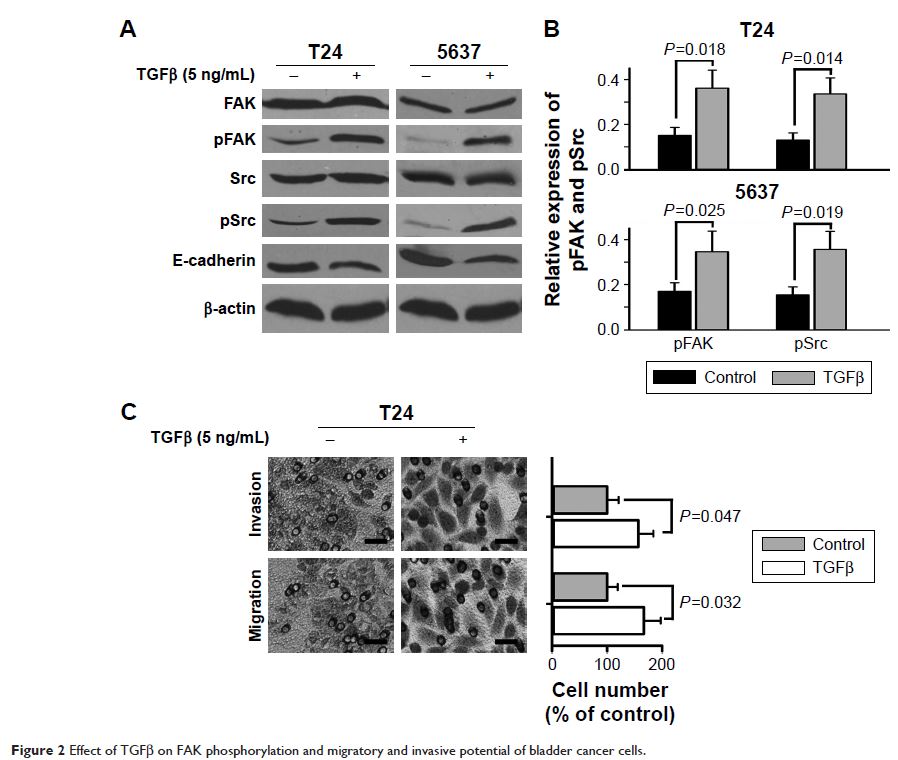109568
论文已发表
注册即可获取德孚的最新动态
IF 收录期刊
- 3.4 Breast Cancer (Dove Med Press)
- 3.2 Clin Epidemiol
- 2.6 Cancer Manag Res
- 2.9 Infect Drug Resist
- 3.7 Clin Interv Aging
- 5.1 Drug Des Dev Ther
- 3.1 Int J Chronic Obstr
- 6.6 Int J Nanomed
- 2.6 Int J Women's Health
- 2.9 Neuropsych Dis Treat
- 2.8 OncoTargets Ther
- 2.0 Patient Prefer Adher
- 2.2 Ther Clin Risk Manag
- 2.5 J Pain Res
- 3.0 Diabet Metab Synd Ob
- 3.2 Psychol Res Behav Ma
- 3.4 Nat Sci Sleep
- 1.8 Pharmgenomics Pers Med
- 2.0 Risk Manag Healthc Policy
- 4.1 J Inflamm Res
- 2.0 Int J Gen Med
- 3.4 J Hepatocell Carcinoma
- 3.0 J Asthma Allergy
- 2.2 Clin Cosmet Investig Dermatol
- 2.4 J Multidiscip Healthc

焦点粘附激酶通过 Src 激酶和 E-钙粘蛋白对 TGFβ 诱导的膀胱癌细胞迁移和侵袭起重要调节作用
Authors Kong D, Chen F, Sima N
Received 16 September 2016
Accepted for publication 10 February 2017
Published 23 March 2017 Volume 2017:10 Pages 1783—1792
DOI https://doi.org/10.2147/OTT.S122463
Checked for plagiarism Yes
Review by Single-blind
Peer reviewers approved by Dr Akshita Wason
Peer reviewer comments 4
Editor who approved publication: Prof. Dr. Geoffrey Pietersz
Abstract: Focal adhesion kinase (FAK) is a non-receptor protein-tyrosine kinase
that is triggered off by special extracellular signals such as some growth
factors and integrins. FAK is found in cell–matrix attachment sites and
implicated in cell migration, invasion, movement, gene expression, survival and
apoptosis. In this study, we aimed to investigate whether FAK plays a role in
invasion and migration of bladder cancer cells. Using an FAK-specific small
interfering RNA (siRNA) and an FAK inhibitor PF-228, we found that inhibition
of FAK tyrosine phosphorylation or knockdown of FAK suppressed invasion and
migration of bladder cancer cells. Src is an important mediator of
FAK-regulated migratory and invasive activity. Tyrosine phosphorylation of Src
and FAK is mutually dependent and plays a key role in transforming growth
factor beta (TGFβ)-induced invasion and migration. E-cadherin acts downstream
of FAK and is a critical negative regulator in FAK-regulated invasion and
migration of bladder cancer cells. These findings imply that FAK is involved in
oncogenic signaling of invasion and migration, which can be a novel therapeutic
target to treat patients with bladder cancer.
Keywords: focal
adhesion kinase, transforming growth factor beta, migration/invasion, bladder
cancer, Src kinase, E-cadherin
